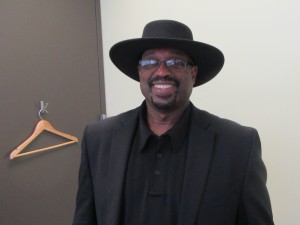Juvenile Center director all about the kids
Kevin Beese — June 16, 2015
Leonard Dixon, the new director of the Cook County Juvenile Detention Center, wants to get more youths out of detention cells and back in the community. (Photo by Kevin Beese/For Chronicle Media)
The cold, blank white walls of Leonard Dixon’s office seems appropriate for his job as head of Cook County’s Juvenile Temporary Detention Center, a drab facility at 11th and Hamilton in Chicago, that can hold 382 youths.The only visible personal item throughout the office is Dixon’s black cowboy hat on a table at the back of the room.
In a few weeks, an office revamp will change all that. The walls of the new director’s office will be plastered with awards and photos of the director, who has spoken before both the U.S. House and Senate, with various public officials. However, there is one personal possession that he can’t wait to have in place: his basketball.
“I need to get my basketball in here,” Dixon said. “Then I can go to the gym, shoot around with the kids.”
Making a connection with kids — whether on the basketball court, during a conversation or in a counseling session — is vital to turning their lives around, said Dixon, who has spent 37 years in juvenile corrections.
“I am a firm believer that if you don’t love people, you can’t help them,” Dixon said
Dixon took over operations of the beleaguered Detention Center in May. He had been transitioning into the positions since February. working with Earl Dunlap, who was the transitional administrator.
In 2007, the federal court transferred the administration of the JTDC from Cook County’s executive branch to the transitional administrator when information revealed that the center was a patronage haven and that staff members were accused of mentally and physically abusing juveniles. In 2008, the Illinois General Assembly transferred control of the facility to Cook County Chief Judge Timothy Evans.
Dixon dove into the job and says he will do whatever it takes to make the facility work for kids.
“I come in at 3 a.m., 5 a.m., on weekends,” Dixon sad. “There hasn’t been a 40-hour week yet.”
But Dixon doesn’t mind the hours as long as the focus stays on improving the facility for the betterment of youth.
“When I met with Chief Judge Evans, we talked about the kids,” Dixon said. ‘First and foremost, things have to be about the kids.”
A basketball player in college, Dixon expected to go into coaching. Coming from a law-enforcement family, the Florida native expected to go into police work to supplement his income. However, a position came open first in corrections in Miami.
“I got in and I found I liked it,” Dixon said.
He worked his way up the corrections chain, working every job along the way.
When he reached the top in Miami youth corrections, he instituted programs with other agencies to get youths out of detention cells. He got the average number of incarcerated youths down from 350 to 200. In Detroit, he lowered the average number of incarcerated youths from 400 to 110.
He plans to bring that same “it takes a village” mentality to the Cook County Juvenile Detention Center.
“The longer kids remain in detention, the more institutionalized they become,” Dixon said.
Dixon said one law he would like to change in Illinois, where the juvenile legal system began, is for youths to be first go through the juvenile system before going to adult court.
The Southerner, who regularly wears a cowboy hat and boots, knows his methods are proven and will work in Cook County.
“I know I can do exceptionally well doing what I’m doing,” Dixon said.



